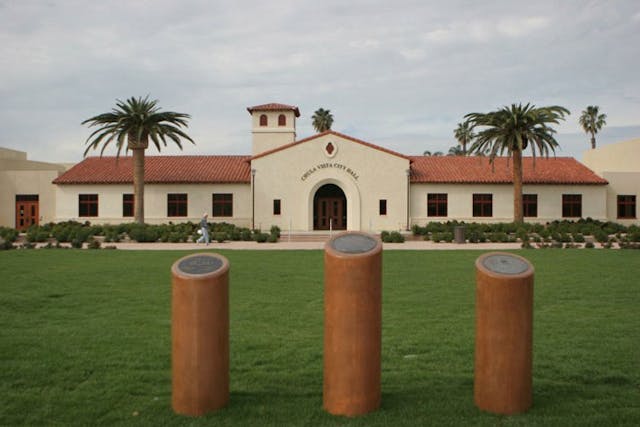La Bamba on Dewey and Logan

Joe Ruffo and his wife Lollie had opened the La Bamba Bar right after the war, just as the canerias were starting to hire everybody in Logan Heights to clean and pack fish. Canneries like Sun Harbor, Vankamps and Chicken of the Sea would even hire mothers and abuelitas to clean fish and pay them piece mill. The money wasn’t great but at least it was a job.
The last couple of years, since they opened La Bamba Bar, things had gone very well for Joe and Lollie Ruffo; the bar had become a popular place with the cannery workers, Longshoremen and the neighborhood. In fact things were going so good, that they were getting anxious for 1951 to be over, as they had just signed a lease for another bar on the corner of 38th and National Avenue alongside Woody’s Liquor store. They were going to call it the “10-20 Club” and they planned to open it January of 1952.
The idea for the 10-20 clubs was to make it a western joint, where the Anglos, who lived in Shelltown and National City, could go get a beer and listen to some down home “Hillbilly Music.” Joe and Lollie Ruffo realized that catering to what people wanted could make money. Their neighbor “Texas Red Rodgers “had convinced them that a western bar, playing Hillbilly music couldn’t be run by Mexicans, but a bar with a front manager like him-self…could work. Thus the idea of the 10-20 was born, the name came from the idea that they would be so successful that all the cash register would have would be 10s and 20s; no one dollar bills.
Their lawyer, Mr. Adams had advised them not to put Texas Red Rodgers on the new license for the 10-20, as William J. Buonanota, Board of Equalization did not like dealing with people who didn’t know the “right people” and this could complicate the approval. In the City of San Diego, approval for a liquor license meant three things. First, the Vice Lieutenant of the San Diego Police Department has to give his okay. Second, the beat cops, which in the case of Logan Heights would be second generation Mexican-American policeman Manuel Jones, Jr. and his partner, Johnnie Walker one of three black police officers on the force, would also have to consent. This was ensure that the license holder would not be a shitbird and cause trouble for everybody.
Finally, William J. Buonanota, State Board of Equalization, would only deal with certain lawyers in town, for reasons known only to him. Louie Adams, Joe and Lollie Ruffo’s lawyer had gone to USC with William Buonanota back in ‘39. Joe Ruffo had known Manuelito Jones and his family back in Loreto, Baja California. In fact the Ruffo’s, the Jones’, the Verdugo’s, the Smiths and several other families all migrated together to Calexico, then Lemon Grove and finally ended up in Logan Heights in 1920. The “cachanilla families” stayed connected to each other, for good and bad. Joe Ruffo had seen Manuel Jones Jr., affectionately known to his relatives and friends as “Dukie,” grow up to be a fine young man, having played football at San Diego High, distinguished himself while serving in Korea and now a policemen serving the same neighborhood that his father Manuelito Jones, Sr. had twenty years earlier.
Dukie Jones and Johnnie Walker had no problem with Joe and Lollie Ruffo getting the license for the 10-20 club, although they didn’t especially care for Texas Red Rodgers. They had had problems with Texas Red, getting his slow-witted cousin, Melvin “Chowder” Birch into bar fights, with old Filipino men about half his size.
Chowder Birch weighed 290 and stood, six feet five inches. The last time Chowder Birch beat up some old man, he made the mistake of doing it in the presence of an ex-fighter, George Stampanoulos, who took offense and damn near killed Chowder and Texas Red.
Manuel Jones Jr. and his partner Johnnie Walker liked the way Joe and Lollie Ruffo ran the La Bamba bar and they had already told Vice Lieutenant Ledford that they approved the new license for the 10-20 under one condition, that they keep an eye on Texas Red Rodgers. Keeping an eye on Texas Red at the 10-20 would also give them a reason, to jack up, a couple of tough Okie brothers, Clyde and Lucas Baker, who were running a junkyard and chop shop on Main street, between San Diego and National City. The Bakers joined the Navy during World War 2 and they just never went back to their hometown of Gotebo, Oklahoma. Since the war, they had been in a lot of trouble. They were known to hang around with Texas Red Rodgers and his cousin Chowder. They hated everything about Shelltown, especially the neighbors, but they never moved away.
The families that had migrated together from Loreto and Comondu, Baja California to San Diego in 1920, like the Smiths, Ruffo, Collins, Mesas, Bareño all had some connection to each other prior to winding up in Logan Heights. Some by blood, some by marriage, some by compadrismo or others by convenience. They also all had relatives spread throughout Baja California in places like Mexicali, Tecate, Ensenada and Tijuana and a few returned to Loreto. They affectionately referred to themselves as “cachanillas” meaning a person native to Baja California.
The cachanilla families learned two valuable lessons on their journey from Loreto to San Diego; one was that family was everything and two, that sticking together, was always best. La Bamba Bar was also a place, where friends, relatives and parientes from Tijuas, could come to get the latest word on work, who was fighting with whom, who was in the “bote” and what compadre, was about to get his ticket punched for being a little too friendly with his comadre.
Joe and Lollie Ruffo both had come from big families from Baja. Joe Ruffo, however wasn’t as close to his family as he used to be because of a dispute with his cousins over some property in Ensenada. Lollie on the other hand was a Meza Smith. The Meza Smith family was one of the largest families with many relatives on both sides of the border. She had made an effort through the years, to try and stay in touch with as many parientes as possible. She was especially proud of her cousin Emanuel Romero Smith, who had been a journalist in Tijuana for many years, then in 1947, he started his newspapers called “La Verdad,” which turned out to be one of the most read newspapers in Tijuana. He had also developed an agreement with the San Diego Union, to report for them about Mexico.
Emanuel Romero Smith had distinguished himself for his work, in promoting the idea of statehood for Baja California. He had hoped to be elected to the first local legislature by the “Partido Pro-Estado,” but he was not selected for the slate. He knew, that the influyentes did not want him around because he kept asking the wrong questions and challenging them to do better by the colonias populares.
Emanuel Romero Smith had received word from his cousin Lollie Ruffo, that Manuel Jones Jr. “el Dukie” wanted to talk to him about a very urgent matter and that he needed to come to La Bamba Bar as soon as possible.
Dukie Jones had through his father, made many friends in Little Italy; friends who would share information and help each other out. He learned that Gaspare Bacala, a recently deported Sicilian who was living in Tijuana had been contacted by some people connected to Baja California’s territorial authorities about taking care of a problem. It was described to him, as a newspaperman, who was about to expose the connection between the houses of prostitution in Tijuana, Mexicali and Ensenada and a family members of some very high state authorities. Don Gaspare declined the offer but felt it important to get word to Dukie Jones.
A week later, Emanuel Romero Smith was in his office at “La Verdad,” newspaper on the corner of Agua Caliente and Morelos with his daughter Alma, getting ready to edit the exposé edition. All of a sudden, Alma heard knocking at the front door of La Verdad. Emanuel told her to go see who it was. She opened the door and to her surprise, four big men with guns drawn rushed past her shooting her father from all sides. Two of them men were dressed as policemen and the other two wore dark trench coats. As her father collapsed he screamed, “run mija run!” She ran and hid in the dark room and waited for an hour, before coming out and going for help. For some reason Alma was spared.
It was a rainy Saturday afternoon and it had been some days since Lollie Ruffo had heard from her cousin. She liked Big Nando the bartender, because he had always been polite and would keep track of Lollie’s parientes, who came to La Bamba looking for her or Joe. She made her way to La Bamba and walked over to the bar, “Nando, has my cousin Emanuel Romero Smith, the newspaper guy been in looking for Dukie Jones or me?” Nando replied, “Not that I can remember.”
While the murder of Emanuel was investigated, no one was ever charged. They almost got away with it; however, his funeral attracted so much international and national press, due to his connection to the San Diego Union/Tribune that the president of Mexico was forced to remove the territorial governor. His family members were subsequently prosecuted for gross acts of corruption.
The 10-20 club opened its doors, on February 1, 1952, to the sounds of Smokey Rodgers and his Kickers. There was beer and hillbilly music and the Baker Brothers just waiting to start some stuff. Manuel Jones, Jr. and Johnnie Walker were eagerly waiting in their squad car a block south of the 10-20 club in front of St Jude’s Church to accommodate the Baker Brothers all over their head and bodies.



 Arturo Castañares
Arturo Castañares


